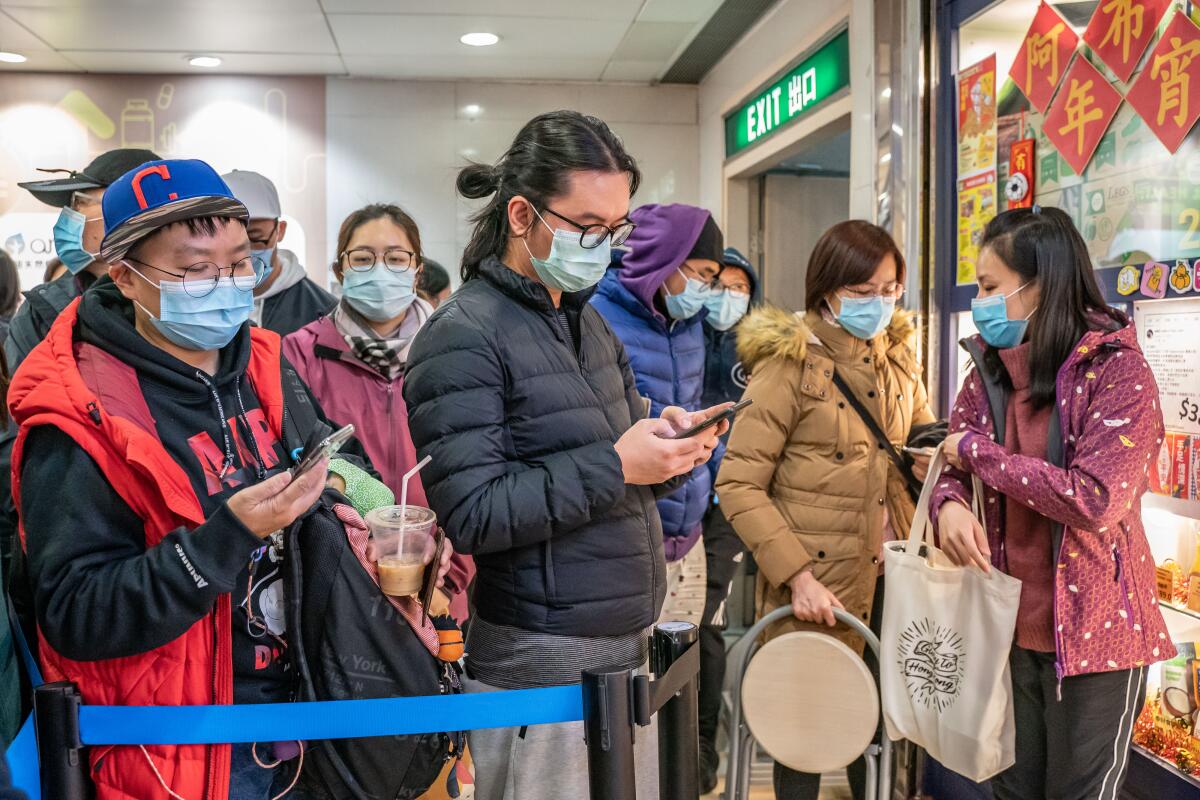Amid coronavirus threat, UC Irvine and other schools cancel study abroad programs in China

- Share via
Last summer, Andie Yu arrived in Beijing for a yearlong program at Peking University. The UC Irvine computer science student from Las Vegas was eager to improve her Mandarin and gain experience to be a more competitive job candidate in China.
But her program was cut short after the University of California suspended all non-essential travel to China, including study abroad programs, in response to the fast-spreading coronavirus.
Now, Yu, 23, an American citizen, is stuck in Xiamen, China, where she has relatives. She booked a flight to Los Angeles but is unsure when she’ll make it home to her parents in Las Vegas — and expects she’ll be quarantined.
UC Irvine’s planned 9-acre health sciences complex at the corner of Bison and California avenues will feature new homes for the Susan and Henry Samueli College of Health Sciences and the Sue and Bill Gross School of Nursing.
Yu is among hundreds of college students nationwide whose study plans have been upended by intensifying response to the virus. Students and university officials alike are scrambling to secure visas and flights back to the United States, reenroll in coursework so as not to lose out on an entire semester, or find alternate study abroad programs, typically a highlight of students’ college experience.
“Study abroad is for most students challenging to schedule into their degree advancement at all. So if it doesn’t work in the planned semester, it’s unlikely it’s going to work in some other semester,” said Caroline Maas, senior vice president for study global operations at the Council on International Educational Exchange. “For these individual students who have been planning to study abroad, in some cases for years, it’s pretty tragic.”
The blow to these academic exchanges between the U.S. and China is one of the myriad ways in which the virus, officially named COVID-19, has disrupted lives around the world. As of Sunday, there had been more than 71,300 confirmed cases and 1,775 deaths from the virus worldwide.
Panelists at a two-hour public seminar Monday night at UC Irvine said there are still new things being learned about the international outbreak of novel coronavirus, though the risk of infection in Orange County remains low. They cautioned against overreaction and misinformation.
CIEE, which describes itself as the largest study abroad provider in the U.S., has canceled both its spring and summer offerings in China. The move affected students across the country.
When the late January cancellations hit, most students’ home institutions had already begun classes. Just a handful of CIEE programs, including “Berlin Business and Culture” and “Perth Arts and Sciences,” remained open for enrollment. Students were given the option of switching to those programs for the same or lower cost or receiving a refund for their China studies.
But some students were advanced Chinese speakers seeking language immersion.
“An English-language program taught in Europe and focusing on business and communications and history clearly wasn’t going to work,” Maas said. So CIEE created new Chinese-intensive programs in Taiwan and London and moved many students there instead.
Yu was one of about 50 spring participants in China programs administered directly through UC. A native of Fujian province, she grew up primarily speaking a local dialect. She immigrated to the U.S. after elementary school. Spending a year in Beijing, she hoped, would help her become fluent in Mandarin and teach her about Chinese society.
Yu was visiting relatives in Gutian when she got the news that her program was suspended.
“All my plans got messed up,” she said.
At first, she asked to continue her studies since she was already in China. But, Yu said, she was told the program was suspended, in accordance with UC policy for countries under serious travel advisories.
With UC Irvine’s winter quarter already well underway, returning to classes on campus wasn’t an option. Yu was offered the chance to apply to Korea University but took too long to make up her mind, she said.
Even trying to collect her belongings and return to Las Vegas has been an ordeal. As she traveled last week from Gutian to Xiamen, she walked a quarter-mile down a highway to cross a checkpoint, where officials took her temperature, she said. She can’t go back to Beijing to get her things from the Peking University dorm, so she’s asked a teacher there to ship them to relatives. She had to cancel a flight home, paying a $300 penalty, because passengers from China can no longer arrive directly in Las Vegas.
U.S. officials said early Monday that 14 American passengers evacuated from the Diamond Princess cruise ship in Japan had tested positive for the new coronavirus, but were allowed on flights to military bases in California and Texas.
At USC, where study abroad in China is a part of many business students’ education, officials have been “working like crazy” to respond to the effects of the coronavirus, said Tyrone Callahan, vice dean for undergraduate programs at the Marshall School of Business.
A popular leadership course for about 80 freshmen, for example, educates students on Chinese history and the economy and then sends them on a weeklong trip to Beijing and Shanghai over spring break.
“We spend a lot of time telling them how amazing it is to be able to go and see what’s happening in China … so when we had to pull back from that, they were obviously disappointed,” Callahan said.
Those students will instead split the week between Havana and Mexico City.
Nina Agrawal and Anh Do write for the Los Angeles Times.
All the latest on Orange County from Orange County.
Get our free TimesOC newsletter.
You may occasionally receive promotional content from the Daily Pilot.






